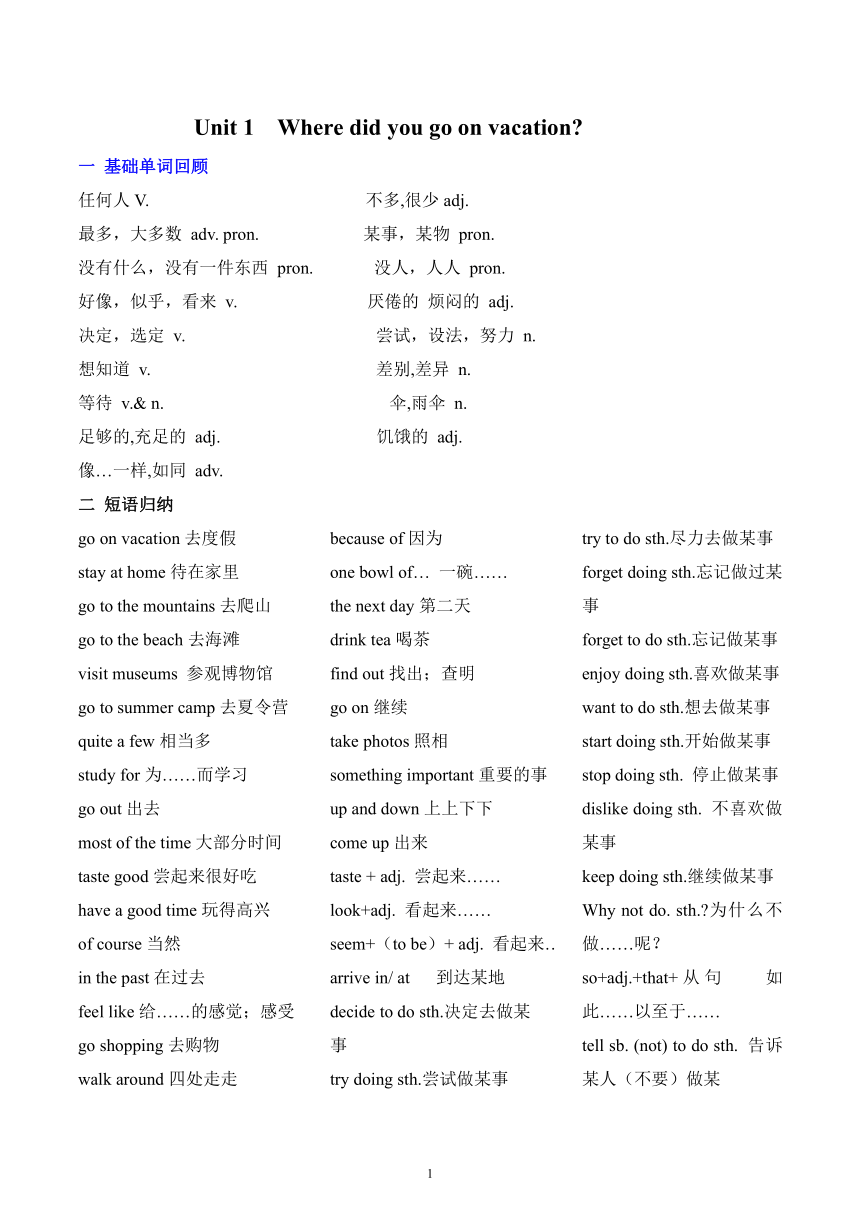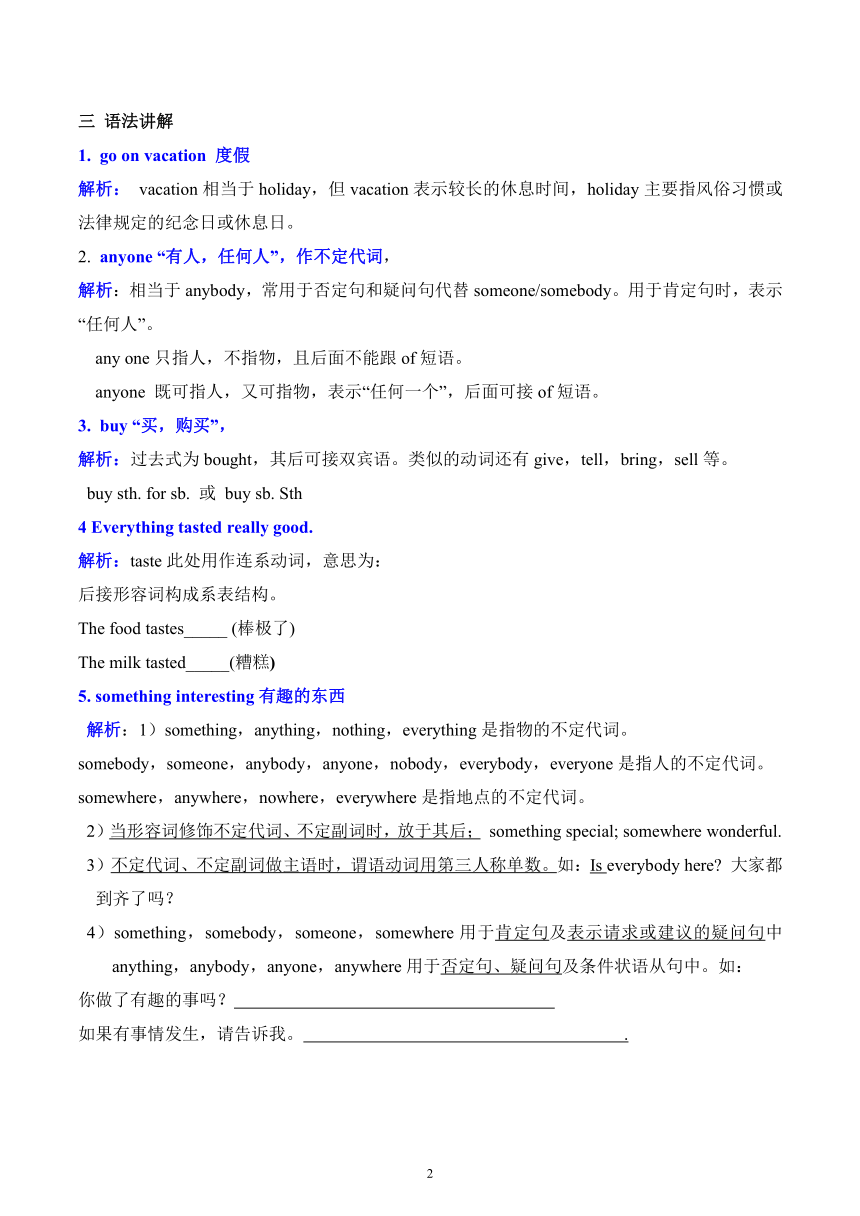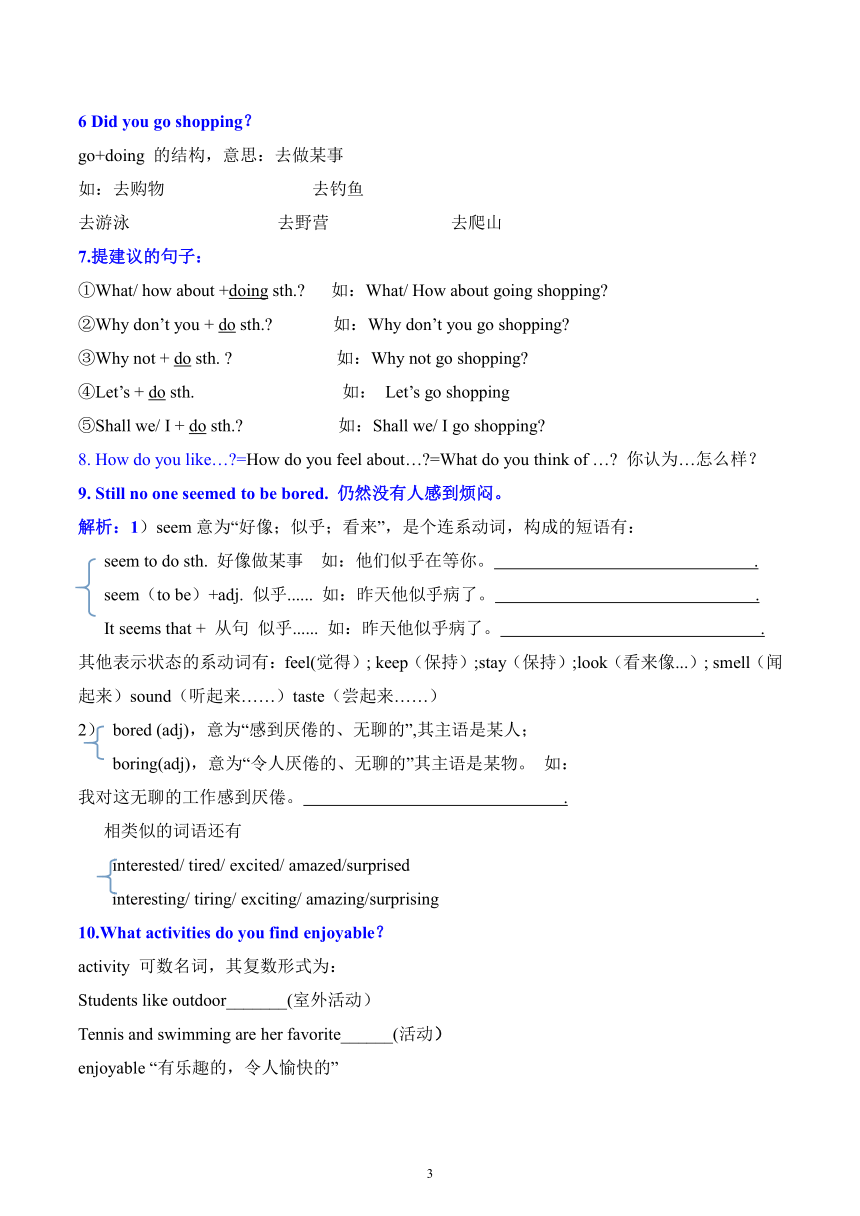Unit 1 Where did you go on vacation? 知识清单人教版八年级英语上册
文档属性
| 名称 | Unit 1 Where did you go on vacation? 知识清单人教版八年级英语上册 |  | |
| 格式 | doc | ||
| 文件大小 | 83.2KB | ||
| 资源类型 | 教案 | ||
| 版本资源 | 人教新目标(Go for it)版 | ||
| 科目 | 英语 | ||
| 更新时间 | 2024-01-06 13:25:36 | ||
图片预览



文档简介
Unit 1 Where did you go on vacation
一 基础单词回顾
任何人V. 不多,很少adj.
最多,大多数 adv. pron. 某事,某物 pron.
没有什么,没有一件东西 pron. 没人,人人 pron.
好像,似乎,看来 v. 厌倦的 烦闷的 adj.
决定,选定 v. 尝试,设法,努力 n.
想知道 v. 差别,差异 n.
等待 v.& n. 伞,雨伞 n.
足够的,充足的 adj. 饥饿的 adj.
像…一样,如同 adv.
二 短语归纳
go on vacation去度假
stay at home待在家里
go to the mountains去爬山
go to the beach去海滩
visit museums 参观博物馆
go to summer camp去夏令营
quite a few相当多
study for为……而学习
go out出去
most of the time大部分时间
taste good尝起来很好吃
have a good time玩得高兴
of course当然
in the past在过去
feel like给……的感觉;感受
go shopping去购物
walk around四处走走
because of因为
one bowl of… 一碗……
the next day第二天
drink tea喝茶
find out找出;查明
go on继续
take photos照相
something important重要的事
up and down上上下下
come up出来
taste + adj. 尝起来……
look+adj. 看起来……
seem+(to be)+ adj. 看起来……
arrive in/ at 到达某地
decide to do sth.决定去做某事
try doing sth.尝试做某事
try to do sth.尽力去做某事
forget doing sth.忘记做过某事
forget to do sth.忘记做某事
enjoy doing sth.喜欢做某事
want to do sth.想去做某事
start doing sth.开始做某事
stop doing sth. 停止做某事
dislike doing sth. 不喜欢做某事
keep doing sth.继续做某事
Why not do. sth. 为什么不做……呢?
so+adj.+that+从句 如此……以至于……
tell sb. (not) to do sth. 告诉某人(不要)做某
三 语法讲解
go on vacation 度假
解析: vacation相当于holiday,但vacation表示较长的休息时间,holiday主要指风俗习惯或法律规定的纪念日或休息日。
anyone “有人,任何人”,作不定代词,
解析:相当于anybody,常用于否定句和疑问句代替someone/somebody。用于肯定句时,表示“任何人”。
any one只指人,不指物,且后面不能跟of短语。
anyone 既可指人,又可指物,表示“任何一个”,后面可接of短语。
buy “买,购买”,
解析:过去式为bought,其后可接双宾语。类似的动词还有give,tell,bring,sell等。
buy sth. for sb. 或 buy sb. Sth
4 Everything tasted really good.
解析:taste此处用作连系动词,意思为:
后接形容词构成系表结构。
The food tastes_____ (棒极了)
The milk tasted_____(糟糕)
5. something interesting有趣的东西
解析:1)something,anything,nothing,everything是指物的不定代词。
somebody,someone,anybody,anyone,nobody,everybody,everyone是指人的不定代词。
somewhere,anywhere,nowhere,everywhere是指地点的不定代词。
2)当形容词修饰不定代词、不定副词时,放于其后; something special; somewhere wonderful.
3)不定代词、不定副词做主语时,谓语动词用第三人称单数。如:Is everybody here 大家都到齐了吗?
4)something,somebody,someone,somewhere用于肯定句及表示请求或建议的疑问句中anything,anybody,anyone,anywhere用于否定句、疑问句及条件状语从句中。如:
你做了有趣的事吗?
如果有事情发生,请告诉我。 .
6 Did you go shopping?
go+doing 的结构,意思:去做某事
如:去购物 去钓鱼
去游泳 去野营 去爬山
7.提建议的句子:
①What/ how about +doing sth. 如:What/ How about going shopping
②Why don’t you + do sth. 如:Why don’t you go shopping
③Why not + do sth. 如:Why not go shopping
④Let’s + do sth. 如: Let’s go shopping
⑤Shall we/ I + do sth. 如:Shall we/ I go shopping
8. How do you like… =How do you feel about… =What do you think of … 你认为…怎么样?
9. Still no one seemed to be bored. 仍然没有人感到烦闷。
解析:1)seem意为“好像;似乎;看来”,是个连系动词,构成的短语有:
seem to do sth. 好像做某事 如:他们似乎在等你。 .
seem(to be)+adj. 似乎...... 如:昨天他似乎病了。 .
It seems that + 从句 似乎...... 如:昨天他似乎病了。 .
其他表示状态的系动词有:feel(觉得); keep(保持);stay(保持);look(看来像...); smell(闻起来)sound(听起来……)taste(尝起来……)
2) bored (adj),意为“感到厌倦的、无聊的”,其主语是某人;
boring(adj),意为“令人厌倦的、无聊的”其主语是某物。 如:
我对这无聊的工作感到厌倦。 .
相类似的词语还有
interested/ tired/ excited/ amazed/surprised
interesting/ tiring/ exciting/ amazing/surprising
10.What activities do you find enjoyable?
activity 可数名词,其复数形式为:
Students like outdoor_______(室外活动)
Tennis and swimming are her favorite______(活动)
enjoyable “有乐趣的,令人愉快的”
try 及物动词,“尝试,试图,设法,努力”。名词,“尝试”,
解析:常用短语have a try。
try doing sth. 尝试做某事
try to do sth. 尽力、设法做某事
12. nothing much to do “没什么事可做”
nothing...but...意为“除......之外也没有;只有”,如:
我整天除了看电视什么也没干。 .
13 I feel like I was a bird. It was so exciting
解析:① feel like
可加名词,意思是:觉得好像 It feels like silk.
可加doing,感觉像,I feel like catching a cold
想要做, 相当于want to do
我想去公园散步。
可加从句
他感觉他在飞
我感觉我像一只鸟。
I really enjoyed walking around the town.
解析: enjoy doing sth . 喜欢做…;乐意做…
enjoy oneself 过得愉快 =have fun/have a good time.
have a good time doing sth. 做某事很开心
15.What a difference a day makes
①difference 名词,意思是:
形容词为:
be different from 意思是:
副词为:
用适当形式填空
What is the_____ between this book and that book?
My book is _____ from yours.
He thinks ______. 他想的不一样.
16 We waited over an hour for the train because there were too many people.
解析:①wait for 意思: 可接人或物
他正在等公交车.
我在校门口等你
② over 超过,多于,在数目,程度上。
例句:
在我们学校有超过三百个学生.
我妈妈40多岁了。
17. I wonder what life was like here in the past. 我想知道过去这里的生活是什么样的
解析:作名词,“奇迹;令人惊讶的事情” 如:No wonder! 难怪;不足为奇!
作动词,“惊讶” 如:wonder at sth. ; wonder to do sth.
“感到疑惑;想知道”,其后常接who,what,why或if引导的宾语从句。
我想知道你是否能帮助我。 .
我想知道他们在这儿做什么。 .
18. few与little 的区别:
肯定 否定 许多
可数 a few Few quite a few/not a few
不可数 a little Little quite a little/ not a little
如:There is little sugar in the bottle. Can you get some
decide(v)决定
decide to (not) do sth. = make a decision (not) to do sth.
decision(n) make a decision to do do sth. 决定做某事
李雷已经决定去北京。 .
20. Because of the bad weather, we couldn’t see anything below.
解析:1)because of + 名词/代词/名短 I had to move because of my job. 因为工作的原因
because + 从句 如:I do it because I like it. 我做这件事是因为我喜欢。
2)below意为“在......下面;低于”,其反义词为 above,意为“在......上面;高于”
2. 形容词/副词+enough 如:足够漂亮
enough +名词 如:足够多的雨伞
足够 (形/副)+enough+ (名) to do sth. 足够…去做…
我有足够的钱去北京。 .
她年龄不够,不能去上学。 .
21. “如此...以至于...”so+形/副+that从句= such+名短+ that从句
She is so popular that everyone likes her. = She is such a popular girl that...
so that引导目的状语从句,“以便,为了”。
他每天早上早起以便能赶上公交车。 .
What a difference a day makes! 一天的差异多大啊!
解析:make a difference in…:对…有影响
1)What a/an + adj.+ n(单)+主+谓!或 What + adj. +n(复不)+主+谓!
2)How+ adj. +主+谓(连系动词)!或 How + adv+主+谓(实义动词)!
23. as 作副词,“像...一样,如同”,用来表示程度,后跟形容词/副词原级,常用于as...as结构。
否定形式为not as/so...as。莉莉唱得像歌手一样好。 .
作介词,“作为,当作”。他当了10年的老师。 .
作连词,“像,按照”。你必须按照我说的那样做事。 .
作连词,“当...的时候”。学生们说话的时候,老师进来了。 .
24. with 介词,“具有,带有”。我想拥有一个带花园的大房子。 .
“和...一起”。我经常和朋友一起去上学。 .
“以(...手段),用(...工具)”。用刀切苹果。 .
25. keep doing sth“继续做某事,一直做某事”
昨天他一直看了两个小时的电视。 .
26. jump “跳跃”,不及物动词。
听到这个消息,我们高兴地跳起来。 .
常用短语:jump into跳入 jump out of跳出 jump over跳过 jump off跳离
27 come up “升起,发生”。太阳从东方升起。 .
come相关短语:
come down下降,降落 come out出版,出来 come in 进来 come up with想出(主意)
come over过来 come true实现,成为现实 come on加油 come along进展,一起去
一 基础单词回顾
任何人V. 不多,很少adj.
最多,大多数 adv. pron. 某事,某物 pron.
没有什么,没有一件东西 pron. 没人,人人 pron.
好像,似乎,看来 v. 厌倦的 烦闷的 adj.
决定,选定 v. 尝试,设法,努力 n.
想知道 v. 差别,差异 n.
等待 v.& n. 伞,雨伞 n.
足够的,充足的 adj. 饥饿的 adj.
像…一样,如同 adv.
二 短语归纳
go on vacation去度假
stay at home待在家里
go to the mountains去爬山
go to the beach去海滩
visit museums 参观博物馆
go to summer camp去夏令营
quite a few相当多
study for为……而学习
go out出去
most of the time大部分时间
taste good尝起来很好吃
have a good time玩得高兴
of course当然
in the past在过去
feel like给……的感觉;感受
go shopping去购物
walk around四处走走
because of因为
one bowl of… 一碗……
the next day第二天
drink tea喝茶
find out找出;查明
go on继续
take photos照相
something important重要的事
up and down上上下下
come up出来
taste + adj. 尝起来……
look+adj. 看起来……
seem+(to be)+ adj. 看起来……
arrive in/ at 到达某地
decide to do sth.决定去做某事
try doing sth.尝试做某事
try to do sth.尽力去做某事
forget doing sth.忘记做过某事
forget to do sth.忘记做某事
enjoy doing sth.喜欢做某事
want to do sth.想去做某事
start doing sth.开始做某事
stop doing sth. 停止做某事
dislike doing sth. 不喜欢做某事
keep doing sth.继续做某事
Why not do. sth. 为什么不做……呢?
so+adj.+that+从句 如此……以至于……
tell sb. (not) to do sth. 告诉某人(不要)做某
三 语法讲解
go on vacation 度假
解析: vacation相当于holiday,但vacation表示较长的休息时间,holiday主要指风俗习惯或法律规定的纪念日或休息日。
anyone “有人,任何人”,作不定代词,
解析:相当于anybody,常用于否定句和疑问句代替someone/somebody。用于肯定句时,表示“任何人”。
any one只指人,不指物,且后面不能跟of短语。
anyone 既可指人,又可指物,表示“任何一个”,后面可接of短语。
buy “买,购买”,
解析:过去式为bought,其后可接双宾语。类似的动词还有give,tell,bring,sell等。
buy sth. for sb. 或 buy sb. Sth
4 Everything tasted really good.
解析:taste此处用作连系动词,意思为:
后接形容词构成系表结构。
The food tastes_____ (棒极了)
The milk tasted_____(糟糕)
5. something interesting有趣的东西
解析:1)something,anything,nothing,everything是指物的不定代词。
somebody,someone,anybody,anyone,nobody,everybody,everyone是指人的不定代词。
somewhere,anywhere,nowhere,everywhere是指地点的不定代词。
2)当形容词修饰不定代词、不定副词时,放于其后; something special; somewhere wonderful.
3)不定代词、不定副词做主语时,谓语动词用第三人称单数。如:Is everybody here 大家都到齐了吗?
4)something,somebody,someone,somewhere用于肯定句及表示请求或建议的疑问句中anything,anybody,anyone,anywhere用于否定句、疑问句及条件状语从句中。如:
你做了有趣的事吗?
如果有事情发生,请告诉我。 .
6 Did you go shopping?
go+doing 的结构,意思:去做某事
如:去购物 去钓鱼
去游泳 去野营 去爬山
7.提建议的句子:
①What/ how about +doing sth. 如:What/ How about going shopping
②Why don’t you + do sth. 如:Why don’t you go shopping
③Why not + do sth. 如:Why not go shopping
④Let’s + do sth. 如: Let’s go shopping
⑤Shall we/ I + do sth. 如:Shall we/ I go shopping
8. How do you like… =How do you feel about… =What do you think of … 你认为…怎么样?
9. Still no one seemed to be bored. 仍然没有人感到烦闷。
解析:1)seem意为“好像;似乎;看来”,是个连系动词,构成的短语有:
seem to do sth. 好像做某事 如:他们似乎在等你。 .
seem(to be)+adj. 似乎...... 如:昨天他似乎病了。 .
It seems that + 从句 似乎...... 如:昨天他似乎病了。 .
其他表示状态的系动词有:feel(觉得); keep(保持);stay(保持);look(看来像...); smell(闻起来)sound(听起来……)taste(尝起来……)
2) bored (adj),意为“感到厌倦的、无聊的”,其主语是某人;
boring(adj),意为“令人厌倦的、无聊的”其主语是某物。 如:
我对这无聊的工作感到厌倦。 .
相类似的词语还有
interested/ tired/ excited/ amazed/surprised
interesting/ tiring/ exciting/ amazing/surprising
10.What activities do you find enjoyable?
activity 可数名词,其复数形式为:
Students like outdoor_______(室外活动)
Tennis and swimming are her favorite______(活动)
enjoyable “有乐趣的,令人愉快的”
try 及物动词,“尝试,试图,设法,努力”。名词,“尝试”,
解析:常用短语have a try。
try doing sth. 尝试做某事
try to do sth. 尽力、设法做某事
12. nothing much to do “没什么事可做”
nothing...but...意为“除......之外也没有;只有”,如:
我整天除了看电视什么也没干。 .
13 I feel like I was a bird. It was so exciting
解析:① feel like
可加名词,意思是:觉得好像 It feels like silk.
可加doing,感觉像,I feel like catching a cold
想要做, 相当于want to do
我想去公园散步。
可加从句
他感觉他在飞
我感觉我像一只鸟。
I really enjoyed walking around the town.
解析: enjoy doing sth . 喜欢做…;乐意做…
enjoy oneself 过得愉快 =have fun/have a good time.
have a good time doing sth. 做某事很开心
15.What a difference a day makes
①difference 名词,意思是:
形容词为:
be different from 意思是:
副词为:
用适当形式填空
What is the_____ between this book and that book?
My book is _____ from yours.
He thinks ______. 他想的不一样.
16 We waited over an hour for the train because there were too many people.
解析:①wait for 意思: 可接人或物
他正在等公交车.
我在校门口等你
② over 超过,多于,在数目,程度上。
例句:
在我们学校有超过三百个学生.
我妈妈40多岁了。
17. I wonder what life was like here in the past. 我想知道过去这里的生活是什么样的
解析:作名词,“奇迹;令人惊讶的事情” 如:No wonder! 难怪;不足为奇!
作动词,“惊讶” 如:wonder at sth. ; wonder to do sth.
“感到疑惑;想知道”,其后常接who,what,why或if引导的宾语从句。
我想知道你是否能帮助我。 .
我想知道他们在这儿做什么。 .
18. few与little 的区别:
肯定 否定 许多
可数 a few Few quite a few/not a few
不可数 a little Little quite a little/ not a little
如:There is little sugar in the bottle. Can you get some
decide(v)决定
decide to (not) do sth. = make a decision (not) to do sth.
decision(n) make a decision to do do sth. 决定做某事
李雷已经决定去北京。 .
20. Because of the bad weather, we couldn’t see anything below.
解析:1)because of + 名词/代词/名短 I had to move because of my job. 因为工作的原因
because + 从句 如:I do it because I like it. 我做这件事是因为我喜欢。
2)below意为“在......下面;低于”,其反义词为 above,意为“在......上面;高于”
2. 形容词/副词+enough 如:足够漂亮
enough +名词 如:足够多的雨伞
足够 (形/副)+enough+ (名) to do sth. 足够…去做…
我有足够的钱去北京。 .
她年龄不够,不能去上学。 .
21. “如此...以至于...”so+形/副+that从句= such+名短+ that从句
She is so popular that everyone likes her. = She is such a popular girl that...
so that引导目的状语从句,“以便,为了”。
他每天早上早起以便能赶上公交车。 .
What a difference a day makes! 一天的差异多大啊!
解析:make a difference in…:对…有影响
1)What a/an + adj.+ n(单)+主+谓!或 What + adj. +n(复不)+主+谓!
2)How+ adj. +主+谓(连系动词)!或 How + adv+主+谓(实义动词)!
23. as 作副词,“像...一样,如同”,用来表示程度,后跟形容词/副词原级,常用于as...as结构。
否定形式为not as/so...as。莉莉唱得像歌手一样好。 .
作介词,“作为,当作”。他当了10年的老师。 .
作连词,“像,按照”。你必须按照我说的那样做事。 .
作连词,“当...的时候”。学生们说话的时候,老师进来了。 .
24. with 介词,“具有,带有”。我想拥有一个带花园的大房子。 .
“和...一起”。我经常和朋友一起去上学。 .
“以(...手段),用(...工具)”。用刀切苹果。 .
25. keep doing sth“继续做某事,一直做某事”
昨天他一直看了两个小时的电视。 .
26. jump “跳跃”,不及物动词。
听到这个消息,我们高兴地跳起来。 .
常用短语:jump into跳入 jump out of跳出 jump over跳过 jump off跳离
27 come up “升起,发生”。太阳从东方升起。 .
come相关短语:
come down下降,降落 come out出版,出来 come in 进来 come up with想出(主意)
come over过来 come true实现,成为现实 come on加油 come along进展,一起去
同课章节目录
- Unit 1 Where did you go on vacation?
- Section A
- Section B
- Unit 2 How often do you exercise?
- Section A
- Section B
- Unit 3 I'm more outgoing than my sister.
- Section A
- Section B
- Unit 4 What's the best movie theater?
- Section A
- Section B
- Unit 5 Do you want to watch a game show?
- Section A
- Section B
- Unit 6 I'm going to study computer science.
- Section A
- Section B
- Unit 7 Will people have robots?
- Section A
- Section B
- Unit 8 How do you make a banana milk shake?
- Section A
- Section B
- Unit 9 Can you come to my party?
- Section A
- Section B
- Unit 10 If you go to the party, you'll have a grea
- Section A
- Section B
